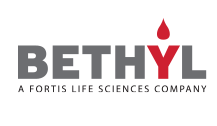Rabbit anti-ANKRD17 IHC Antibody Affinity Purified

Product Details
Specifications
The epitope recognized by IHC-00596 maps to a region between residue 1550 and 1600 of human ankyrin repeat domain 17 using the numbering given in entry NP_115593.3 (GeneID 26057).
Immunoglobulin concentration was determined using Beer’s Law where 1mg/mL IgG has an A280 of 1.4. Antibody was affinity purified using an epitope specific to ANKRD17 immobilized on solid support.
The epitope recognized by IHC-00596-T maps to a region between residue 1550 and 1600 of human ankyrin repeat domain 17 using the numbering given in entry NP_115593.3 (GeneID 26057).
Immunoglobulin concentration was determined using Beer’s Law where 1mg/mL IgG has an A280 of 1.4.
Additional Product Information
ANKRD17 (ankyrin-repeat domain-containing protein 17) contains 25 ankyrin repeats and a K homology domain. It was originally identified as an antigen recognized by antibodies in the serum of breast cancer patients. Studies in mice show that this protein is involved in hepatic differentiation.
Alternate Names
ankyrin repeat domain-containing protein 17; gene trap ankyrin repeat protein; GTAR; MASK2; NY-BR-16; serologically defined breast cancer antigen NY-BR-16
Applications
Epitope exposure is recommended.
Epitope exposure with citrate buffer will enhancer staining.
Likely to work with frozen sections.
In some cases, the antibody may be diluted further than indicated.
